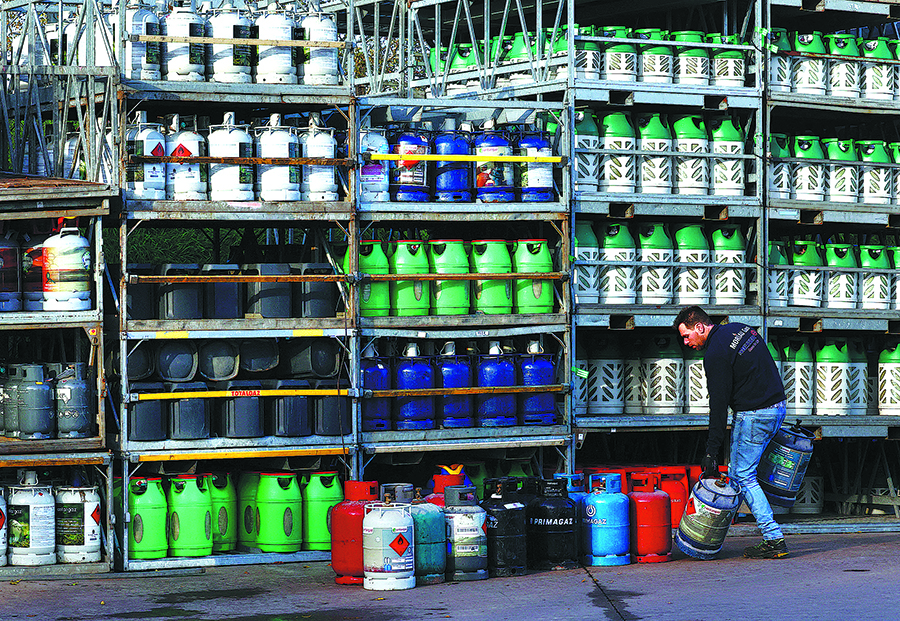Gas price cap bid sunk in 'heated' EU talks
China Daily | Updated: 2022-11-26 07:43

BRUSSELS — European Union energy ministers failed on Thursday to agree on a cap on gas prices to mitigate the energy crunch in Europe, amid deep divisions over an initial proposal slammed by some as a "joke".
An emergency meeting of energy ministers only showed how the energy crisis tied to the conflict in Ukraine has divided the 27-nation bloc into almost irreconcilable blocs.
"The discussion was quite heated, and you all know that there are very divergent views," said Czech Industry Minister Jozef Sikela, who chaired the meeting where ministers could not agree on when and how a price cap on gas purchases should kick in.
A massive spike in natural gas prices in August stunned all but the wealthiest in Europe, forcing the bloc to look for a cap to contain volatile prices that are fueling inflation.
But the EU is deadlocked between nations demanding cheaper gas to ease household bills — including Greece, Spain, Belgium, France and Poland — and those like Germany and the Netherlands insisting supplies are at risk if a cap stops EU countries from buying gas above a certain price.
A solution was nowhere near the horizon — to the frustration of many.
"It's already minus 10 (Celsius) in Poland," the nation's energy minister, Anna Moskwa, said.
The inability to find a compromise on the price cap also held up plans for joint gas purchases and a solidarity mechanism to help the neediest member states because the measures would be agreed on as a package.
Another emergency energy meeting was set for Dec 13.
"The differences are really still major," Dutch Energy Minister Rob Jetten said. "It means there is an awful amount of work ahead over the next two weeks."
The Polish and Spanish energy ministers called the proposal a "joke".
The price cap plan sets a maximum threshold of 275 euros ($287) per megawatt hour. But it comes with so many conditions attached that it would not even have been activated back in August, when the gas price briefly soared above 300 euros, alarming Europeans used to prices around 10 percent of that.
Condition for trigger
The cap proposal would only be triggered if the 275-euro limit was breached continuously for at least two weeks, and then only if the price for liquefied natural gas rose above 58 euros for 10 days within that same two-week period.
Before the Ukraine conflict, Russian gas supplies accounted for more than 40 percent of all imported gas into the EU, with export powerhouse Germany particularly needy.
That has now dropped to less than 10 percent.
But alternative sources cannot make up the shortfall, and Europe faces a pricey heating bill for winter.
Except for natural gas, Western countries are also stepping up their efforts to put a price cap on Russia's oil.
In the US, President Joe Biden said on Thursday that the price cap on Russian oil was "in play", adding that he had spoken to Treasury Secretary Janet Yellen on the issue.
However, the Kremlin warned on Thursday that those plans to introduce oil price caps could have "grave consequences" for energy markets.
"(Russian President) Vladimir Putin stressed that such actions are contrary to the principles of market relations and are highly likely to lead to grave consequences for global energy markets," the Kremlin said in a readout of Putin's call with Iraqi Prime Minister Mohammed Shia al-Sudani. The Kremlin said both sides had also spoken positively of the two countries' work within the framework of OPEC + which helps "stabilize the world oil market."
The Kremlin stressed that Moscow does not plan to supply oil to countries supporting a price cap on Russian oil.
Also within the framework, the energy ministers of Saudi Arabia and Iraq on Thursday stressed the importance of adhering to OPEC+ output cuts that last until the end of 2023. In the alliance's last meeting on Oct 5, an output cut of 2 million barrels a day was agreed.
Xinhua
























